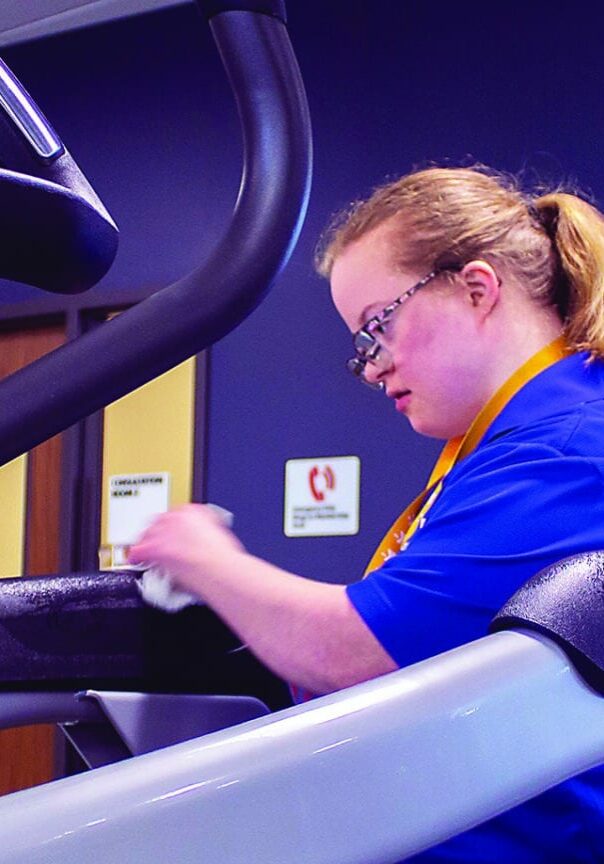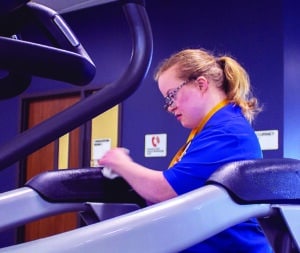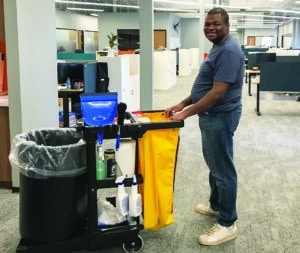Employment Program Changes
Jan 31, 2023

Finding community-based alternatives to center-based work to reduce our reliance on center-based production work and eliminate special minimum wage.
The phrase, “A partnership that works” has floated around Rise for decades. As historic sayings go, those four words perfectly sum up our services.
Our founding more than 50 years ago happened because of community partnerships that formed based on an entirely new idea of what was possible for all people, including those with disabilities. Partnerships grew, and Rise began offering robust center-based work opportunities. Over time, we’ve expanded our relationships to add community-based employment opportunities with competitive wages, which in recent years have grown stronger.
Now we are on the verge of another partnership shift. Over the next 16 months, our center-based employment programs will be phased out in favor of community-based programs. We anticipate this change to be complete by April 2024.

Leah began her first community-based job at the Forest Lake, Minn. YMCA about six months ago. With support from her employment consultant and her supervisor, Leah is making strides.
What does all this mean?
This is a significant change for all of Rise, especially our production operations in Spring Lake Park, Oakdale and New Richmond, Wisc., which are impacted most. Center-based jobs that typically pay a special minimum wage (wages allowed by the Federal Government through a special certificate to pay people less than minimum wage based on their productivity) will be phased out as we develop new partnerships and alternatives to allow even more community employment options.
“Policies, laws, and funding at the state and federal levels are changing,” said Chief Program Officer Tim Dickie. “The focus has moved to community integration and competitive employment as a preferred option for people with disabilities. Reducing center-based work offerings allows us to move closer to that goal.”
Federally, the US Commission on Civil Rights is asking Congress to end special minimum wages because the commission believes the program “limits people with disabilities from realizing their full potential.” Here at home, several disability organizations consistently lobby to end special minimum wages, and both Minnesota and Wisconsin (and many other states) have adopted new policies that advocate for more competitive and integrated employment opportunities for people with disabilities.
Because there are so many change efforts underway at both the Federal and state levels, we believe a legislative mandate to end special minimum wage will be enacted within the next few years.
“Rise is one of the largest special minimum wage employers in the United States,” said Rise President and CEO Lynn Noren. “Given the large number of people we support who continue to utilize special minimum wages, we feel it is critical to take further action now instead of waiting for official mandates.”
Change already underway.

Ade recently began a “dream job” cleaning at Merchology. This is his first community-based position.
Over the past four-and-a-half-years, we have assisted more than 125 people in moving from center-based or group community employment to competitive employment. We have worked with existing production partners to transition their work to supported employment SET sites and are also developing new SET sites. Rise Direct Support Professionals currently working with our production teams will also be given opportunities to transition to community-based employment sites or program locations.
We are also developing a more comprehensive menu of day services to include a variety of meaningful learning opportunities and community-based activities for people who choose these options over work.
“There will be more opportunities to participate in small group skill-building activities, enjoy art and sensory activities, utilize technology, participate in social activities, volunteer at other local organizations, and engage in continued supports toward other employment and life enrichment goals,” Dickie said.
Those who are affected by these changes have already been notified. This transition will be open and transparent because we know the anxiety change can bring. “People will not be left behind,” said Noren. “Our team is ready to provide the support people expect during this transition, and we are working closely to develop individual successful employment and enrichment paths for each person we serve who is currently in center-based employment and is now making decisions about their future,” she said.
“We recognize the uncertainty that this news might bring,” Noren said. “At the same time we are also excited about the new opportunities it will create for people to make living wages, and become more familiar with their friends, neighbors, and new coworkers. That’s why we do the work we do and why we continue creating new business partnerships because they really do work!”
As many of you know, policy direction at the state and federal level is moving towards the elimination of special minimum wages and center-based employment. While this movement has been underway for many years, it is gaining significant momentum and support. Most recently, the Minnesota legislature passed a bill that establishes a task force to plan for phasing out special minimum wages by August 2025. This same legislation will make grant funds available to providers to eliminate special minimum wages by April 1, 2024. Rise intends to pursue these grant funds to support our continued efforts in this area, thus we are adopting April 1, 2024 as our own internal target date for phasing out special minimum wages and center-based employment.
Given this time frame and the large number of persons served who continue to utilize special minimum wages, we will need to be even more aggressive and creative in our efforts to help people explore and secure other meaningful service options at Rise (i.e., SET employment, competitive employment, or day services). We know that many of the individuals working in-center have been reluctant to consider other options. We will need to work closely with each person served (and their team) to explain our direction and to develop individualized plans accordingly. The attached background/talking points may be useful for these discussions.
If you have any ideas, suggestions, etc. on how to advance this work, or if you have questions/concerns, please do not hesitate to reach out to me or your director. This is a big initiative for Rise; your feedback is welcomed.
Special Minimum Wages – Background and Implications for Rise
10/12/2021
Background
Section 14c of the Fair Labor Standards Act authorizes employers, after receiving a certificate from the Wage and Hour Division, to pay special minimum wages – wages less than the Federal minimum wage – to workers who have disabilities for the work being performed. Special minimum wages must be commensurate wage rates – based on the worker’s individual productivity in proportion to the wage and productivity of experienced workers who do not have disabilities.
Policy/Funding Outlook
• The Minnesota legislature recently passed a bill that establishes a task force to plan for phasing out special minimum wages by August 2025.
• Both Minnesota and Wisconsin (and most other states) have adopted “Employment First” policies, advocating for competitive, integrated employment to be the first option for people with disabilities. This includes aligning funding practices accordingly.
• The US Commission on Civil Rights is asking Congress to end special minimum wages, stating that it “continues to limit people with disabilities from realizing their full potential”.
• Several disability advocacy organizations (e.g. ARC Minnesota, APSE) are lobbying to end special minimum wages.
• As of 2021, any new individuals served under the waiver will have a 3-year time limit on center-based employment services
• The funding rule for individual’s served under Minnesota’s “Extended Employment” program placed a cap on non-competitive employment as well as a 5-year phaseout of all center-based employment.
Based on the above, we believe the most likely scenario is that special minimum wages will be eliminated through legislative action within the next few years. Given the large number of people that continue to utilize special minimum wages at Rise, we feel it is critical to take further action now vs waiting for official mandates. Additionally, attaching Rise to any efforts against the elimination of special minimum wages would not be helpful to our reputation as a progressive, forward-thinking provider. In some circles, special minimum wage providers are perceived as old-school, resistant to change, self-serving, or even discriminatory. Even though we excel at placing people in competitive employment, continuing the use of special minimum wages carries a significant reputational risk and marketing challenge. Additionally, Rise is currently one of the largest providers of special minimum wages in Minnesota and U.S.
Rise Response
In addition to the recent goal of phasing out special minimum wages by April 1, 2024, Rise has taken several steps over the past few years to reduce special minimum wages and advance community employment:
• Eliminated all “simulated work” (paid training activities for which there is no real job being completed or reimbursement to cover costs)
• Stopped developing community employment sites that pay less than minimum wage and converted several existing sites to minimum wage.
• Implemented policy for new referrals after 7/1/21 to have alternative services and to not be served under Rise’s Special Minimum Wage Certificate.
• Implemented policy that ALL persons served who have not earned special minimum wages for a consecutive 6 months (after 7/1/2021) will no longer be eligible for special minimum wages (for currently enrolled individuals who have not returned to services by 12/31/2021, the eligibility period will be extended to 7/1/2022).
• Consolidated production operations in Anoka and Washington county.
• Increased efforts to help people move from special minimum wage work to competitive employment. Over the last 4 years, Rise has helped over 125 people move from center-based or group community employment to competitive employment.
We are also developing a comprehensive menu of day services to include a variety of meaningful learning opportunities and community-based activities for people who choose these options.
Talking Points / FAQ
Why is Rise phasing out special minimum wages and center-based employment?
Policies, laws, and funding at the state and federal levels are changing. The focus is on community integration and competitive employment as a preferred option for people with disabilities. Reducing center-based work offerings allows us to move closer to that goal.
What kind of alternative service options will be available?
In addition to community-based employment (SETs and competitive), we are developing a comprehensive menu of day services to include a variety of meaningful learning opportunities and community-based activities for people who choose these options. There will be more opportunities to participate in small group skill-building activities, enjoy art and sensory activities, utilize technology, participate in social activities, volunteer at other local organizations, and engage in continued supports toward other employment and life enrichment goals.
I have MA-EPD, so I need to still earn money every month. What should I do?
It’s not possible to have a one-size fits all answer for people on MA-EPD. We’ll have to look at each person’s individual circumstances and plan based on that. That plan could include work to continue to keep MA-EPD, but it could also include benefits planning that may involve a benefits change. Regardless of what happens, we’ll work with each person and their team to ensure there is plenty of time for planning.
What does this mean for existing center-based DSPs?
Between now and April 1, 2024, we will need internal DSPs to transition to SET sites (or alternatively, one of our day program sites). We do not have a specific timeline for each position and this will not happen all at once; we intend to be very thoughtful and strategic in how we transition our services. We will be offering a $500 bonus to center-based DSPs who move to a SET site (payable after 6 weeks at the SET). In addition to the bonus, some DSPs may be eligible for a wage level change (see DSP wage level criteria).
Overall communication reminders for Rise team members:
You should portray a positive and optimistic attitude in your communications with families, guardians, persons served and other stakeholders. While change can be difficult, we will still continue to offer the highest quality programming. You have the ability to make this change much less stressful for the people that you support and their families by reassuring them.
If you don’t know the answer to a question, you should never guess. It’s best to make a note of it and tell the person you’ll find out and get back to them. Then get an answer and follow-up as promptly as possible.